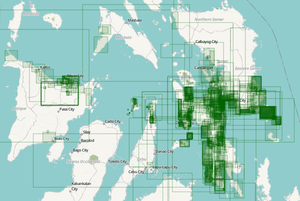2014 DRC Ebola Response
| General Information | |
|
2014 DRC Ebola Response is an Activation of the Humanitarian OSM Team to provide map data to assist the response to this disease outbreak. Claire Halleux is coordinating this Humanitarian Team Activation.
On August 24th, Médecins Sans Frontières / Doctors Without Borders (meeting with HOT) express their actual need of getting more accurate geographic data for the area. Ebola virus is detected and outbreak is officially announced by authorities. 3 tasks were immediately set up for the highest priority area on the HOT Tasking Manager and completed by contributors within a short time. On September 1st OCHA (together with WFP - Logistics Cluster) formally requests HOT to activate in order to help facing logistical issues and response coordination. Bing Imagery was not available in various areas where epidemy suspected cases were reported. The MapGive project supported this activation providing some additional high-resolution imagery to cover the gaps. The last Ebola-positive case was detected on October 4th, 2014. The end of the outbreak is expected to be officially announced on November 15th. The WHO Ebola response roadmap - Situation report update, dated 21 November 2014 declared the 2014 Ebola outbreak in DRC as over. | |
Map and Data Services
About OpenStreetMap
OpenStreetMap offers an online map (and spatial database) which is updated by the minute. Various online maps are based on OpenStreetMap including Navigation tools such as OSRM. Tools and services allow data extracts for GIS specialists, Routable Garmin GPS data, Smartphone GPS navigation, and other device-compatible downloads. With an internet connection, regular syncing is possible with open access to the community contributed data as it comes in, with OpenStreetMap's bulk data downloads ideal for use offline. In addition, maps can also be printed to paper.
Browse the Activation Area to get a feel for the data that is currently available. Different map styles including an Humanitarian style can be selected on the right side, and some data may not render (appear) on the map, but could be exported from the underlying database (See export section below).
Exporting OpenStreetMap data
- Export for the "Quarantine zone", a 100 kilometers circle around Lokolia, in various formats (osm.pbf, ESRI shapefile, kmz, PostGis, Spatialite)
- Export for Boende-Monkoto area in various formats (osm.pbf, ESRI shapefile, kmz, PostGis, Spatialite) This area is included within the previous one.
This script can be rerun at any time to obtain up-to-date extracts of OSM
Paper Maps
The Logistics Cluster (UN World Food Programme) currently provides printable maps for some affected places in the area using OSM base map.
To download a map, follow the link, right click on the picture and then "Save As...":
- Ville de Boende (1.6 Mo)
- Village de Bokoto (236 Ko)
- Village d'Ikonge (297 Ko)
- Village de Lokolia (372 Ko)
- Village de Lokula (343 Ko)
- Village de Ngele (270 Ko)
- Village de Watsi Kengo (505 Ko)
Poster size Maps and normal sized paper atlases of custom areas can be printed:
- FieldPapers Paper Maps with grid for field survey or general navigation purposes,
- MapOSMatic Large Paper Maps with grid, street index and POI, good for command centers, hospitals, etc. (MapOSMatic doesn't currently support recently updated data)
About This Humanitarian Activation
About HOT
- To learn more about the Humanitarian OpenStreetMap Team (HOT), explore more of our wiki-pages (root: HOT) or our website hotosm.org. We are a global community of mostly volunteers, we are also a US Nonprofit able to contract with organizations (email info at hotosm.org to contact our staff), we are also a 501-c-3 charitable organization.
How You Can Contribute
Edit the Map
- You can contribute to the response via the internet by tracing buildings, roads, waterways, etc. To react rapidly to support humanitarians deploying, we need a lot of contributors for remote editing. Visit LearnOSM.org to get started.
- More experienced OSM contributors are invited to read guidelines on Highway Tag and revise the classification of roads. You can also assure the quality of the mapping, validating the Task manager tasks or using the various OSM Quality control tools.
- Humanitarian Field teams and local people knowledge is also essential. Complete the map by adding name of roads or various infrastructures. You can edit the map using Small devices. Online or Offline applications are available.
- Add a Note or report an Error using the Notes feature on the Online Map. OSM contributors will edit the map from your comments.
Mapping Priority
- Please choose from highest priority first
- For experienced mappers, information on validating the tasks can be found here.
| Job No. | Priority | Location | What to map | Imagery Source | Task Mapping Status | Task Validation Status |
|---|---|---|---|---|---|---|
| Job 626 | High | Boende - Watsikengo, DRC | roads and residential | Bing | Archived | |
| Job 629 | High | Boende - Watsikengo, DRC | buildings | Bing | Archived | |
| Job 631 | High | Boende, DRC | buildings | Bing | Archived | |
| Job 640 | High | Bokote - Waka, DRC | roads and residential | Bing | Archived | |
| Job 642 | High | Other parts of the quarantine area, DRC | roads and residential | Bing | Archived | |
| Job 648 | High | Bokoto, DRC | roads and residential | WorldView-1, DigitalGlobe, NextView | Archived | |
| Job 649 | High | Boende Moke, DRC | roads and residential | WorldView-1, DigitalGlobe, NextView | Archived | |
| Job 658 | High | Boende city update, DRC | buildings, roads and residential | WorldView-2, DigitalGlobe, NextView | Archived | |
| Job 661 | High | Boende surroundings upto East of Watsi-Kengo, DRC | roads and residential | WorldView-2, DigitalGlobe, NextView | Archived |

